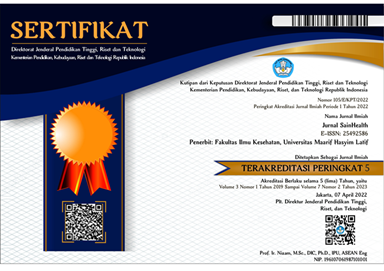EFEKTIVITAS EKSTRAK DAUN BASIL (Ocimum Basilicum) SEBAGAI LARVASIDA TERHADAP LARVA NYAMUK Aedes Aegypti INSTAR III.
DOI:
https://doi.org/10.51804/jsh.v5i2.1519.%25pAbstract
The Aedes aegypti mosquito is a type of mosquito that carries dengue hemorrhagic fever (DHF) and carriers of other diseases. AEdes aegypti mosquitoes usually breed in clean water containers that are used for daily needs - today. Vector control programs around the world are a strategic key in the eradication oflarvae Aedes sp. The use of larvicides is one way to control dengue vectors, while as an alternative to the control Aedes aegypti of resistant, biological insecticides can be used, using basil leaf extract (Ocimum basilicum) which has a larvicidal character. The purpose of this experiment was to determine the effectiveness of basil leaf extract (Ocimum basilicum) as a biolarvicide against mosquito larvae of Aedes aegypti instar III from each concentration. This study uses a type of laboratory experimental research and the sample in this study was the larvae ofmosquito Aedes Aegypti the third instarwhich was divided into several groups, namely the control group and the treatment group with variations in concentration observed at 24 hours repeating 3 times in the same way. The results of this experimentthere was a significant effect on the addition of a solution of basil (leaf extractshowedOcimum bacillicumthat)starting with a concentration of 20% to 100% on the percentage of mortality ofthird instar larvae. Aedes aegypti.
Keywords: Aedes aegypti, Ocimum basilicum, larvacide
Downloads
Published
Issue
Section
License
Jurnal SainHealth is licensed under Creative Commons Attribution 4.0 International License.
Under the following terms:
Attribution — You must give appropriate credit, provide a link to the license, and indicate if changes were made. You may do so in any reasonable manner, but not in any way that suggests the licensor endorses you or your use.
No additional restrictions — You may not apply legal terms or technological measures that legally restrict others from doing anything the license permits.
















